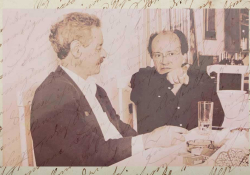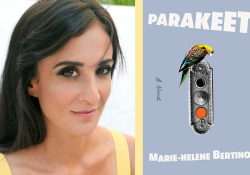The Beginnings of Writers’ Responses to the Easter Sunday Bombings in Sri Lanka

The following essay introduces readers to the early texts that writers produced dealing with the April 21, 2019, bombings targeting Christian places of worship and luxury hotels that hosted many foreigners. After explaining the bombings briefly, this essay explores the one short story, several personal essays, and few poems published online within the weeks after the attacks and shows how the theme of solidarity permeates the texts.
I have spent much of the past five years writing about the literature of Sri Lanka, where I visited in 2014 after one of my students began a Fulbright in Colombo. Hours of reading, traveling, writing dedicated to the literatures of that country—and I never once thought about the Christian population. All my work focused the most present conflict still fresh in the nation’s memory after only a few years’ peace, the tensions between the Sinhalese Buddhist and the Tamil Hindu populations. My work also noted the way Muslims in the island nation were starting to be targets of hatred, as noted in Rohini Mohan’s masterpiece on the decades-long conflict, Seasons of Trouble. In the thousands of pages I read and wrote, Sri Lanka’s Christian population was a blind spot for me—until April 21, 2019, the day now remembered for the Easter Sunday bombings.
On that Sunday of celebration, parishioners at the shrine of St. Anthony Church in Colombo were in the midst of celebrating Christ’s resurrection when at 8:25 the first bomb signaled the beginning of a daylong orchestrated terroristic attack. In twenty-minute increments, the next two churches—St. Sebastian’s in Negombo and Zion Church in Batticaloa—endured bombings. Fifteen minutes later, synchronized bombings occurred at three luxury hotels: the Kingsbury, the Cinnamon Grand, and the Shangri-La. Hours later, the Tropical Inn and a housing complex suffered attacks. Police reported that more planned attacks were thwarted. By the end of the day, 259 people were dead, scores more injured.
Quickly the nation came to a standstill under a state of emergency. In the coming days, the identities of nine suicide bombers—one a pregnant woman—were revealed. Several days later, the militant radical Islamist group National Thowheeth Jama’ath claimed responsibility. Sri Lankan officials believe that the attacks were in retaliation for the Christchurch attacks targeting Muslims in New Zealand a month earlier, though those connections are disputed by New Zealand’s intelligence agencies. In his dispatch from Sri Lanka, novelist Anuk Arudpragasam summarized the confusion over the Christian community being a target: “And why target Christians, of all people, who in this country have hurt nobody for the sake of their beliefs?”
Because the attacks happened less than a year ago, one would expect there to be little published work dealing with the Easter Sunday bombings. However, thanks to the internet and self-publishing, a small body of short works has emerged on the subject—and I imagine novels are being written as I type, though a Google search shows none announced for publication in the near future. (I should note, my discussion is limited to English texts; there may be a larger body of texts in Sinhalese or Tamil, but I am hindered by my lack of knowing those languages.) The texts that do exist focus on solidarity among practitioners of the four major religions in Sri Lanka and despair that the generation raised with little knowledge of the genocide in the nation has been initiated into the fear that once permeated the nation.[i]
The self-published short story “All in a Short Story,” by Inoka Chandrasekara, situates the Easter bombings within the protagonist’s trip home to visit her aging parents in Sri Lanka. “Easter Sunday,” the penultimate story in the collection of what the author calls “slides,” disrupts the visit and the protagonist’s string of memories and family visits. The unnamed protagonist already feels the “browning culture shock” upon arriving in the what-is-to-be-assumed Colombo airport. Many of the slides focus on the connection between food and family, so it is no surprise that “Easter Sunday” begins with the family sitting down to breakfast. Before the bombings, the protagonist shops the main market and hears cries of stall owners selling “real” (and most likely fake) Adidas shoes. Their visit shows them “[r]enewal and hope even in dusty street corners.” Readers can infer that the character’s family—and perhaps the author herself—lived in Sri Lanka during the civil war. A horoscope presented to the character by the father the night before the former’s departure states “Short life due to an accident. Leave the country to avoid fatality.” The protagonist feels secure in knowing they only have “[o]ne more night” in country. However, Easter Sunday brings the sound of “not thunder, both my mother and I concluded.” The urgency of getting out of the country overtakes the story in the midst of a country “spiraling out of control, of explosives, dead bodies and blame game of intelligence.” The curfew means that in order to fly home, the protagonist must feel “calm even bypassing the sadness of leaving my parents. Usually that lingers for nights and days.” They must eventually exit the car and join the throngs of those running in the rain to the airport, where terror inspires heightened security, for in that moment, “everyone was a suspect,” alluding to the curfew and subsequent social media blackout.
A series of personal essays have been published recounting experiencing the attack firsthand or detailing the sadness and anger felt, for some, from a diasporic space. Haneke Manoharan’s harrowing essay tells of looking the bomber in the eye and noting the oddness of him having a backpack at an Easter brunch in the Shangri-La Hotel:
That was when I remember the first guy brushing past me. I remember his face distinctly, he had a thick beard. His eye line sat above mine and he was about 20cm from my face, looking over the top of my head at the tables around us. He had this intense and somewhat preoccupied look in his eyes which I mistook for looking for a table or someone he knew in the restaurant.
- He was so close that I could feel him breathing in my face, so I stepped back into the wall and turned my head away from him. I remember being annoyed that he was in my personal space and in such a rush—it was just breakfast, there wasn’t any need to rudely push past people. Well, that’s what I thought, anyway.
Fortunately, the hostess could not find the couple a favored seat by the windows, “a decision that saved our lives.” What follows is a series of memories that begins with seeing “a bright flash of light” and hearing “a deafening sound.” She is then thrown through the air, a few seconds later waking to the sound of “harrowing, full-throated screaming.” Attempting to help others while making sense of the unimaginable, the author realizes she is covered in blood and “didn’t know if it was my blood or not.” She sees parents carrying their dead children and helps other children escape the building without their parents. She laments for the loss of innocence these children must now endure: “These children were the so-called ‘first innocent generation’ after the end of the civil war in Sri Lanka, almost ten years ago. Now that innocence has been taken away from them.” In a gesture of solidarity that permeates the writing from this historical moment, Manoharan proclaims solidarity with the people of Sri Lanka, the people she considers family even if she was born in Australia:
This could have happened anywhere in the world. My heart breaks for Sri Lanka.
The compassion, love and bravery that permeated the streets of Sri Lanka in the days following the attacks is a real testament to the strength and resilience of the people.
Despite all the grief and despair that has filled the nation, so many people were apologetic to us, but it wasn’t their fault.
The only people to blame are the ones who walked into those hotels and churches on Easter Sunday and thought they had the right to do what they did.
I might be born in Australia, but I still consider myself Sri Lankan, and Sri Lanka will continue to hold a big place in my heart.
I will return in time. I won’t let the meaningless and mindless actions of these extremists taint my view or the connection I feel to such a warm-hearted and beautiful country.
Such sentiments of solidarity amidst the despair are a continuing line in the other personal essays available this soon after the attacks.
“The compassion, love and bravery that permeated the streets of Sri Lanka in the days following the attacks is a real testament to the strength and resilience of the people.”—Haneke Manoharan
One week after the attacks, family members (it is unclear exactly how they are related) Ru, Duranya, and Hasadri Freeman published a collection of essays on Lit Hub under the title “As Sri Lanka Goes So Goes the World.” The three read in different ways and shift genres, but the underlying message of all three is that disunity will not win, and all the diaspora stands with those people living in the rubble of the bombings. Ru’s essay almost takes the form of an op-ed, with a call to action for readers: “As such, the response must be shaped by a global consciousness that values inclusiveness over marginalization and ostracism.” Ru succinctly summarizes the terror that could be wrought inside the nation a week after the bombings (some of which very much comes to fruition as the weeks turn into months):
Inside the country, citizens must resist the temptation to play identity politics in the face of this tragedy. Sri Lankan Christians suffered a terrible loss of life, Sri Lankan Muslims fear being tarnished by the association of their faith to that of the perpetrators, Sri Lankan Hindus are reliving old fears, and Sri Lankan Buddhists are susceptible to the ravings of their own extremists. Yet all of these groups required, yearned for, celebrated, and attempted to embrace peace. The majority of them still do. The myopia and villainy of seven suicide bombers must not be read as tarnishing the character of the many who read of peace, not terror, in the same holy books. What should not be forgotten, in the midst of mayhem, is that the real victim is the psyche of a nation which is, in the end, the psyche of its people.
Duranya frames her response with the story of two cousins, both of whom live under the shadow of terrorism, to mourn the loss of innocence for a generation of Sri Lankan children. Using the story of the cousins, she pushes the reader to see that the “attack was not religious or political . . . [but] an attack on Sri Lankan culture” because the cousins, like many of the neighbors and families in Sri Lanka, do not share religious beliefs but celebrate each other’s holidays. She boldly summarizes the feeling of solidarity into one sentence: “Sri Lankans are a unit.” Hasadri explores the tensions embedded in her hybridity—especially tension surrounding her hair and her name—to show the reader just what a relief she feels when she returns to Sri Lanka, which she considers her home. Part photo-essay, this piece illustrates why her liminality pushes her to finding home in Sri Lanka that “accepted us where America didn’t/doesn’t” (she even must create a liminal space in time with a slash). The theme of solidarity reappears here in the form of her Amma, who “introduced us to prayer of all kinds—we inhabited temples and churches and mosques with equal reverence,” a tendency that was not “not unique to her, but simply a result of her Sri Lankan, multicultural upbringing.” Eventually, Hasadri proclaims Sri Lanka as mother because only “Sri Lanka says my name. . . . I have never felt foreign there. . . . She is a mother.” All three writers lament the attack for its assault on what they see to be the best thing about Sri Lanka: its openness and celebration of all beliefs.[ii]
The poetry that quickly arose in the week after the attacks echoes a commitment to the nation’s multiculturalism. Days after the bombing, journalist Malinda Seneviratne published “The Heartbeat of My Country.” In it, he uses the sounds from a variety of religious celebrations as a metaphor for the heartbeat of the nation:
I have heard the heartbeat of my country
In the tolling of the bell on Samanala Kanda,
The healing drone of pirith weaving its way
Through tree and conversation,
In the call for prayer,
Allah O Akbar,
The church choir and the hymn
And the chanting of the Poosari.
By naming elements of all four major religions, he is showing the importance of multiculturalism to the nation’s ability to thrive, for this heartbeat is “the resolve / To overcome tragedy / Bury it with a smile and move on.” The poem is presented in the three main languages of the country to invite a wide readership in the days after the bombing as the nation began to heal from the terror.
By naming elements of all four major religions, Seneviratne is showing the importance of multiculturalism to the nation’s ability to thrive, for this heartbeat is “the resolve / To overcome tragedy / Bury it with a smile and move on.”
Another poem, this one published eight days after the bombing as part of Rattle’s series “Poets Respond,” which calls for poetry created within a week of an urgent event, imagines the different roles mothers play in the bombings and their aftermath. Sharanya Manivannan’s “The Mothers” gives a different mother’s perspective in each stanza to show the ways motherhood complicates the experience of victimhood—and complicity:
A mother wearing glass beads looking for
another handkerchief, the melted candy
in the one she is carrying as sticky as
the nose being wiped on her arm, under
church fans too slow for this April heat.
A mother whose only existing photograph of him
was borrowed permanently by someone who
told her they could be trusted with her story,
praying to the saint who restores what has
been lost, on her knees again
—again, as many times as it will take.
A mother whose own countenance howls
in frames the whole world scrolls past,
captured by someone who did not care to
learn her name or the names of her dead.
A mother who is Amma, her other name forgotten—
the word a scream in the room at the morgue where
beloveds are identified by wedding rings
and blood-splashed shoes on a projection screen.
A mother who wishes they could have gone for a swim
first, but they are so hungry she has to stand between
them in the buffet line so they don’t break into a fight.
A mother with a baby keeping time
inside her body, a mother with a bomb.
A mother in the kitchen measuring the sugar
generously, preparing this Easter’s feast,
waiting for the little ones who must just now
be saying grace in a circle at Sunday school,
waiting for the little ones
to come home.
Manivannan’s “The Mothers” gives a different mother’s perspective in each stanza to show the ways motherhood complicates the experience of victimhood—and complicity.
Seven end-stopped stanzas create seven vignettes of mothers affected by the bombings. Most are surviving their children, the stanza’s enjambed lines creating a rushing, urgent effect within their stories. The shortest stanza, only two lines, imagines the life of the bomber who killed herself while pregnant and also killed her children in her suicide attack. The shortness of that stanza leaves a surplus of lines—because she does not deserve a full stanza after committing the most heinous of acts—which are bestowed upon the final mother, the vision of domesticity creating a sugary feast her children will never enjoy. The innocence lost is crushing, as it is lost by a mother who thought, having survived the terrors of the civil war, her family would be safe.
In the coming years, readers can anticipate a deluge of texts as writers from all genres try to make sense of the unimaginable. In the meantime, readers have several short texts that show the devastation wrought by the Easter bombings and also the nation’s and diaspora’s commitment to maintaining the plurality of faiths the writers clearly hold dear.
Kutztown University of Pennsylvani
[i] It should be noted that in the midst of literary production on the Easter bombings, many Muslim writers have expressed concerns over feeling their voices have been stifled. SLM Hanifa laments, “I feel my creativity died with it. . . . We couldn’t write our experiences during the war, and now we can’t write our experiences during the peace.” Concerns about the ensuing curfews and censorship laws silencing Muslim voices and creating a climate of renewed violence abounds in the literary community in Sri Lanka and abroad.
[ii] Social media also created an immediate space for short texts. For a list of social media literary responses, visit this informal bibliography.











